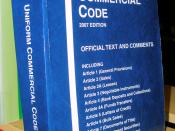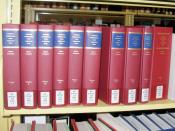1. Prior to the UCC and UCITA, an earlier and more considerable effort of the United States government to uphold consistency within commercial laws was the Commerce Clause. The Commerce Clause bestowed authority upon congress to control business overseas, and amongst the numerous states, also including Indian Tribes (Cheeseman, 2006). Since the Commerce Clause empowers the United States government to control businesses, it encompasses a larger affect on commerce, exceeding every other provision in the U.S. Constitution. Amid additional things, the idea of this article is to promote the expansion of a nationalized marketplace along with liberated trade amongst the states. (Cheeseman, 2006).
2. According to the information offered in the assignment, the main variations that Inoted involving UCITA and Article 2 of the UCC are that UCITA pertain to central processing units (CPU) information transactions. The definition in which UCITA applies to CPU information is as follows "information in a form which is electronic and acquired from or during the utilization of a CPU" (Gilbert, P.,
Grier, R., Keane, N., 2006). Article 2 of the UCC sets forth regulations to manage the sales of merchandise (Cheeseman, 2006). UCITA does not articulate in it's provisions of merchandise in opposition to services (Grier, R., Keane, N., Gilbert, P., 2006). The other difference is the transfer of limited rights, which is also referred to as a license. A license is an agreement which grants admission to, or utilization of, sharing, performance, alteration, duplicate, intelligence or informational rights, but border the right of entry or utilizes approved or explicitly permits less than all privileges within the information, regardless if the transferee obtains title to a licensed replica or not. The term contains a right of entry agreement, a computer program lease, and a consignment of a reproduction (Cheeseman, 2006).
3. The lawful...


